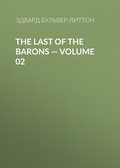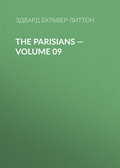
Эдвард Бульвер-Литтон
"My Novel" — Complete
CHAPTER VI
When Harley was gone, Egerton sunk back on his chair, as if in extreme physical or mental exhaustion, all the lines of his countenance relaxed and jaded.
“To go back to that place—there—there—where—Courage, courage! what is another pang?”
He rose with an effort, and folding his arms tightly across his breast, paced slowly to and fro the large, mournful, solitary room. Gradually his countenance assumed its usual cold and austere composure,—the secret eye, the guarded lip, the haughty, collected front. The man of the world was himself once more.
“Now to gain time, and to baffle the usurer,” murmured Egerton, with that low tone of easy scorn, which bespoke consciousness of superior power and the familiar mastery over hostile natures. He rang the bell: the servant entered.
“Is Baron Levy still waiting?”
“Yes, sir.”
“Admit him.” Levy entered.
“I beg your pardon, Levy,” said the ex-minister, “for having so long detained you. I am now at your commands.”
“My dear fellow,” returned the baron, “no apologies between friends so old as we are; and I fear that my business is not so agreeable as to make you impatient to discuss it.”
EGERTON (with perfect composure).—“I am to conclude, then, that you wish to bring our accounts to a close. Whenever you will, Levy.”
THE BARON (disconcerted and surprised).—“Peste! mon cher, you take things coolly. But if our accounts are closed, I fear you will have but little to live upon.”
EGERTON.—“I can continue to live on the salary of a Cabinet Minister.”
BARON.—“Possibly; but you are no longer a Cabinet Minister.”
EGERTON.—“You have never found me deceived—in a political prediction. Within twelve months (should life be spared to me) I shall be in office again. If the same to you, I would rather wait till then formally and amicably to resign to you my lands and this house. If you grant that reprieve, our connection can thus close without the eclat and noise which may be invidious to you, as it would be disagreeable to me. But if that delay be inconvenient, I will appoint a lawyer to examine your accounts, and adjust my liabilities.”
THE BARON (soliloquizing).—“I don’t like this. A lawyer! That may be awkward.”
EGERTON (observing the baron, with a curl on his lip). “Well, Levy, how shall it be?”
THE BARON.—“You know, my dear fellow, it is not my character to be hard on any one, least of all upon an old friend. And if you really think there is a chance of your return to office, which you apprehend that an esclandre as to your affairs at present might damage, why, let us see if we can conciliate matters. But, first, mon cher, in order to become a minister, you must at least have a seat in parliament; and pardon me the question, how the deuce are you to find one?”
EGERTON.—“It is found.”
THE BARON.—“Ah, I forgot the L5,000 you last borrowed.”
EGERTON.—“NO; I reserve that sum for another purpose.”
THE BARON (with a forced laugh).—“Perhaps to defend yourself against the actions you apprehend from me?”
EGERTON.—“You are mistaken. But to soothe your suspicions I will tell you plainly, that finding any sum I might have insured on my life would be liable to debts preincurred, and (as you will be my sole creditor) might thus at my death pass back to you; and doubting whether, indeed, any office would accept my insurance, I appropriate that sum to the relief of my conscience. I intend to bestow it, while yet in life, upon my late wife’s kinsman, Randal Leslie. And it is solely the wish to do what I consider an act of justice, that has prevailed with me to accept a favour from the hands of Harley L’Estrange, and to become again the member for Lansmere.”
THE BARON.—“Ha!—Lansmere! You will stand for Lansmere?”
EGERTON (wincing).—“I propose to do so.”
THE BARON.—“I believe you will be opposed, subjected to even a sharp contest. Perhaps you may lose your election.”
EGERTON.—“If so, I resign myself, and you can foreclose on my estates.”
THE BARON (his brow clearing).—“Look you, Egerton, I shall be too happy to do you a favour.”
EGERTON (with stateliness).—“Favour! No, Baron Levy, I ask from you no favour. Dismiss all thought of rendering me one. It is but a consideration of business on both sides. If you think it better that we shall at once settle our accounts, my lawyer shall investigate them. If you agree to the delay I request, my lawyer shall give you no trouble; and all that I have, except hope and character, pass to your hands without a struggle.”
THE BARON.—“Inflexible and ungracious, favour or not—put it as you will—I accede, provided, first, that you allow me to draw up a fresh deed, which will accomplish your part of the compact; and secondly, that we saddle the proposed delay with the condition that you do not lose your election.”
EGERTON.—“Agreed. Have you anything further to say?”
THE BARON.—“Nothing, except that, if you require more money, I am still at your service.”
EGERTON.—“I thank you. No; I shall take the occasion of my retirement from office to reduce my establishment. I have calculated already, and provided for the expenditure I need, up to the date I have specified, and I shall have no occasion to touch the L5,000 that I still retain.”
“Your young friend, Mr. Leslie, ought to be very grateful to you,” said the baron, rising. “I have met him in the world,—a lad of much promise and talent. You should try and get him also into parliament.”
EGERTON (thoughtfully).—“You are a good judge of the practical abilities and merits of men, as regards worldly success. Do you really think Randal Leslie calculated for public life—for a parliamentary career?”
THE BARON.—“Indeed I do.”
EGERTON (speaking more to himself than Levy).—“Parliament without fortune,—‘t is a sharp trial; still he is prudent, abstemious, energetic, persevering; and at the onset, under my auspices and advice, he might establish a position beyond his years.”
THE BARON. “It strikes me that we might possibly get him into the next parliament; or, as that is not likely to last long, at all events, into the parliament to follow,—not for one of the boroughs which will be swept away, but for a permanent seat, and without expense.”
EGERTON.—“Ay,—and how?”
THE BARON.—“Give me a few days to consider. An idea has occurred to me. I will call again if I find it practicable. Good-day to you, Egerton, and success to your election for Lansmere.”
CHAPTER VII
Peschiera had not been so inactive as he had appeared to Harley and the reader. On the contrary, he had prepared the way for his ultimate design, with all the craft and the unscrupulous resolution which belonged to his nature. His object was to compel Riccabocca into assenting to the count’s marriage with Violante, or, failing that, to ruin all chance of his kinsman’s restoration. Quietly and secretly he had sought out, amongst the most needy and unprincipled of his own countrymen, those whom he could suborn to depose to Riccabocca’s participation in plots and conspiracies against the Austrian dominion. These his former connection with the Carbonari enabled him to track to their refuge in London; and his knowledge of the characters he had to deal with fitted him well for the villanous task he undertook. He had, therefore, already selected out of these desperadoes a sufficient number either to serve as witnesses against his kinsman, or to aid him in any more audacious scheme which circumstance might suggest to his adoption. Meanwhile, he had (as Harley had suspected he would) set spies upon Randal’s movements; and the day before that young traitor confided to him Violante’s retreat, he had at least got scent of her father’s.
The discovery that Violante was under a roof so honoured, and seemingly so safe, as Lord Lansmere’s, did not discourage this bold and desperate adventurer. We have seen him set forth to reconnoitre the house at Knightsbridge. He had examined it well, and discovered the quarter which he judged favourable to a coup-de-main, should that become necessary.
Lord Lansmere’s house and grounds were surrounded by a wall, the entrance being to the high-road, and by a porter’s lodge. At the rear there lay fields crossed by a lane or byroad. To these fields a small door in the wall, which was used by the gardeners in passing to and from their work, gave communication. This door was usually kept locked; but the lock was of the rude and simple description common to such entrances, and easily opened by a skeleton key. So far there was no obstacle which Peschiera’s experience in conspiracy and gallantry did not disdain as trivial. But the count was not disposed to abrupt and violent means in the first instance. He had a confidence in his personal gifts, in his address, in his previous triumphs over the sex, which made him naturally desire to hazard the effect of a personal interview; and on this he resolved with his wonted audacity. Randal’s description of Violante’s personal appearance, and such suggestions as to her character and the motives most likely to influence her actions as that young lynx-eyed observer could bestow, were all that the count required of present aid from his accomplice.
Meanwhile we return to Violante herself. We see her now seated in the gardens at Knightsbridge, side by side with Helen. The place was retired, and out of sight from the windows of the house.
VIOLANTE.—“But why will you not tell me more of that early time? You are less communicative even than Leonard.”
HELEN (looking down, and hesitatingly).—“Indeed there is nothing to tell you that you do not know; and it is so long since, and things are so changed now.”
The tone of the last words was mournful, and the words ended with a sigh.
VIOLANTE (with enthusiasm).—“How I envy you that past which you treat so lightly! To have been something, even in childhood, to the formation of a noble nature; to have borne on those slight shoulders half the load of a man’s grand labour; and now to see Genius moving calm in its clear career; and to say inly, ‘Of that genius I am a part!’”
HELEN (sadly and humbly).—“A part! Oh, no! A part? I don’t understand you.”
VIOLANTE.—“Take the child Beatrice from Dante’s life, and should we have a Dante? What is a poet’s genius but the voice of its emotions? All things in life and in Nature influence genius; but what influences it the most are its own sorrows and affections.”
Helen looks softly into Violante’s eloquent face, and draws nearer to her in tender silence.
VIOLANTE (suddenly).—“Yes, Helen, yes,—I know by my own heart how to read yours. Such memories are ineffaceable. Few guess what strange self-weavers of our own destinies we women are in our veriest childhood!” She sunk her voice into a whisper: “How could Leonard fail to be dear to you,—dear as you to him,—dearer than all others?”
HELEN (shrinking back, and greatly disturbed).—“Hush, hush! you must not speak to me thus; it is wicked,—I cannot bear it. I would not have it be so; it must not be,—it cannot!”
She clasped her hands over her eyes for a moment, and then lifted her face, and the face was very sad, but very calm.
VIOLANTE (twining her arm round Helen’s waist).—“How have I wounded you,—how offended? Forgive me, but why is this wicked? Why must it not be? Is it because he is below you in birth?”
HELEN.—“No, no,—I never thought of that. And what am I? Don’t ask me,—I cannot answer. You are wrong, quite wrong as to me. I can only look on Leonard as—as a brother. But—but, you can speak to him more freely than I can. I would not have him waste his heart on me, nor yet think me unkind and distant, as I seem. I know not what I say. But—but—break to him—indirectly—gently—that duty in both forbids us both to—to be more than friends—than—”
“Helen, Helen!” cried Violante, in her warm, generous passion, “your heart betrays you in every word you say. You weep; lean on me, whisper to me; why—why is this? Do you fear that your guardian would not consent? He not consent? He who—”
HELEN.—“Cease—cease—cease!”
VIOLANTE.—“What! You can fear Harley—Lord L’Estrange? Fie; you do not know him.”
HELEN (rising suddenly).—“Violante, hold; I am engaged to another.”
Violante rose also, and stood still, as if turned to stone; pale as death, till the blood came, at first slowly, then with suddenness from her heart, and one deep glow suffused her whole countenance. She caught Helen’s hand firmly, and said in a hollow voice,
“Another! Engaged to another! One word, Helen,—not to him—not to—Harley—to—”
“I cannot say,—I must not. I have promised,” cried poor Helen, and as Violante let fall her hand, she hurried away. Violante sat down mechanically; she felt as if stunned by a mortal blow. She closed her eyes and breathed hard. A deadly faintness seized her; and when it passed away, it seemed to her as if she were no longer the same being, nor the world around her the same world,—as if she were but one sense of intense, hopeless misery, and as if the universe were but one inanimate void. So strangely immaterial are we really—we human beings, with flesh and blood—that if you suddenly abstract from us but single, impalpable, airy thought, which our souls have cherished, you seem to curdle the air, to extinguish the sun, to snap every link that connects us to matter, and to benumb everything into death, except woe.
And this warm, young, southern nature but a moment before was so full of joy and life, and vigorous, lofty hope. It never till now had known its own intensity and depth. The virgin had never lifted the veil from her own soul of woman.
What, till then, had Harley L’Estrange been to Violante? An ideal, a dream of some imagined excellence, a type of poetry in the midst of the common world. It had not been Harley the man,—it had been Harley the Phantom. She had never said to herself, “He is identified with my love, my hopes, my home, my future.” How could she? Of such he himself had never spoken; an internal voice, indeed, had vaguely, yet irresistibly, whispered to her that, despite his light words, his feelings towards her were grave and deep. O false voice! how it had deceived her! Her quick convictions seized the all that Helen had left unsaid. And now suddenly she felt what it is to love, and what it is to despair. So she sat, crushed and solitary, neither murmuring nor weeping, only now and then passing her hand across her brow, as if to clear away some cloud that would not be dispersed; or heaving a deep sigh, as if to throw off some load that no time henceforth could remove. There are certain moments in life in which we say to ourselves, “All is over; no matter what else changes, that which I have made my all is gone evermore—evermore!” And our own thought rings back in our ears, “Evermore—evermore!”
CHAPTER VIII
As Violante thus sat, a stranger, passing stealthily through the trees, stood between herself and the evening sun. She saw him not. He paused a moment, and then spoke low, in her native tongue, addressing her by the name which she had borne in Italy. He spoke as a relation, and excused his intrusion: “For,” said he, “I come to suggest to the daughter the means by which she can restore to her father his country and his honours.”
At the word “father” Violante roused herself, and all her love for that father rushed back upon her with double force. It does so ever,—we love most our parents at the moment when some tie less holy is abruptly broken; and when the conscience says, “There, at least, is a love that has never deceived thee!”
She saw before her a man of mild aspect and princely form. Peschiera (for it was he) had banished from his dress, as from his countenance, all that betrayed the worldly levity of his character. He was acting a part, and he dressed and looked it.
“My father!” she said, quickly, and in Italian. “What of him? And who are you, signor? I know you not.” Peschiera smiled benignly, and replied in a tone in which great respect was softened by a kind of parental tenderness,—“Suffer me to explain, and listen to me while I speak.” Then, quietly seating himself on the bench beside her, he looked into her eyes, and resumed,—
“Doubtless you have heard of the Count di Peschiera?”
VIOLANTE.—“I heard that name, as a child, when in Italy. And when she with whom I then dwelt (my father’s aunt) fell ill and died, I was told that my home in Italy was gone, that it had passed to the Count di Peschiera,—my father’s foe!”
PESCHTERA.—“And your father, since then, has taught you to hate this fancied foe?”
VIOLANTE.—“Nay, my father did but forbid me ever to breathe his name.”
PESCHIERA.—“Alas! what years of suffering and exile might have been saved your father, had he but been more just to his early friend and kinsman,—nay, had he but less cruelly concealed the secret of his retreat. Fair child, I am that Giulio Franzini, that Count di Peschiera. I am the man you have been told to regard as your father’s foe. I am the man on whom the Austrian Emperor bestowed his lands. And now judge if I am, in truth, the foe. I have come hither to seek your father, in order to dispossess myself of my sovereign’s gift. I have come but with one desire,—to restore Alphonso to his native land, and to surrender the heritage that was forced upon me.”
VIOLANTE.—“My father, my dear father! His grand heart will have room once more. Oh, this is noble enmity, true revenge! I understand it, signor, and so will my father, for such would have been his revenge on you. You have seen him?”
PESCHIERA.—“No, not yet. I would not see him till I had seen yourself; for you, in truth, are the arbiter of his destinies, as of mine.”
VIOLANTE.—“I, Count? I—arbiter of my father’s destinies? Is it possible?”
PESCHIERA (with a look of compassionate admiration, and in a tone yet more emphatically parental).—“How lovely is that innocent joy! But do not indulge it yet. Perhaps it is a sacrifice which is asked from you,—a sacrifice too hard to bear. Do not interrupt me. Listen still, and you will see why I could not speak to your father until I had obtained an interview with yourself. See why a word from you may continue still to banish me from his presence. You know, doubtless, that your father was one of the chiefs of a party that sought to free Northern Italy from the Austrians. I myself was at the onset a warm participator in that scheme. In a sudden moment I discovered that some of its more active projectors had coupled with a patriotic enterprise plots of a dark nature, and that the conspiracy itself was about to be betrayed to the government. I wished to consult with your father; but he was at a distance. I learned that his life was condemned. Not an hour was to be lost. I took a bold resolve, that has exposed me to his suspicions and to my country’s wrath. But my main idea was to save him, my early friend, from death, and my country from fruitless massacre.
“I withdrew from the intended revolt. I sought at once the head of the Austrian government in Italy, and made terms for the lives of Alphonso and of the other more illustrious chiefs, which otherwise would have been forfeited. I obtained permission to undertake myself the charge of securing my kinsman in order to place him in safety, and to conduct him to a foreign land, in an exile that would cease when the danger was dispelled. But unhappily he deemed that I only sought to destroy him. He fled from my friendly pursuit. The soldiers with me were attacked by an intermeddling Englishman; your father escaped from Italy, concealing his retreat; and the character of his flight counteracted my efforts to obtain his pardon. The government conferred on me half his revenues, holding the other half at its pleasure. I accepted the offer in order to save his whole heritage from confiscation. That I did not convey to him what I pined to do,—namely, the information that I held but in trust what was bestowed by the government, and the full explanation of what seemed blamable in my conduct,—was necessarily owing to the secrecy he maintained. I could not discover his refuge; but I never ceased to plead for his recall. This year only I have partially succeeded. He can be restored to his heritage and rank, on one proviso,—a guarantee for his loyalty. That guarantee the government has named: it is the alliance of his only child with one whom the government can trust. It was the interest of all the Italian nobility that the representation of a House so great falling to a female should not pass away wholly from the direct line,—in a word, that you should ally yourself with a kinsman. But one kinsman, and he the next in blood, presented himself. In short, Alphonso regains all that he lost on the day in which his daughter gives her hand to Giulio Franzini, Count di Peschiera. Ah,” continued the count, mournfully, “you shriek, you recoil. He thus submitted to your choice is indeed unworthy of you. You are scarce in the spring of life, he is in its waning autumn. Youth loves youth. He does not aspire to your love. All that he can say is, love is not the only joy of the heart,—it is joy to raise from ruin a beloved father; joy to restore, to a land poor in all but memories, a chief in whom it reverences a line of heroes. These are the joys I offer to you,—you, a daughter, and an Italian maid. Still silent? Oh, speak to me!”
Certainly this Count Peschiera knew well how woman is to be wooed and won; and never was woman more sensitive to those high appeals which most move all true earnest womanhood than was the young Violante. Fortune favoured him in the moment chosen. Harley was wrenched away from her hopes, and love a word erased from her language. In the void of the world, her father’s image alone stood clear and visible. And she who from infancy had so pined to serve that father, who at first learned to dream of Harley as that father’s friend! She could restore to him all for which the exile sighed; and by a sacrifice of self,—self-sacrifice, ever in itself such a temptation to the noble! Still, in the midst of the confusion and disturbance of her mind, the idea of marriage with another seemed so terrible and revolting, that she could not at once conceive it; and still that instinct of openness and honour, which pervaded all her character, warned even her inexperience that there was something wrong in this clandestine appeal to herself.
Again the count besought her to speak, and with an effort she said, irresolutely,
“If it be as you say, it is not for me to answer you; it is for my father.”
“Nay,” replied Peschiera. “Pardon, if I contradict you. Do you know so little of your father as to suppose that he will suffer his interest to dictate to his pride? He would refuse, perhaps, even to receive my visit, to hear my explanations; but certainly he would refuse to buy back his inheritance by the sacrifice of his daughter to one whom he has deemed his foe, and whom the mere disparity of years would incline the world to say he had made the barter of his personal ambition. But if I could go to him sanctioned by you; if I could say, ‘Your daughter overlooks what the father might deem an obstacle,—she has consented to accept my hand of her own free choice, she unites her happiness, and blends her prayers with mine,’—then, indeed, I could not fail of success; and Italy would pardon my errors, and bless your name. Ah, Signorina, do not think of me save as an instrument towards the fulfilment of duties so high and sacred! think but of your ancestors, your father, your native land, and reject not the proud occasion to prove how you revere them all!”
Violante’s heart was touched at the right chord. Her head rose, the colour came back to her pale cheek, she turned the glorious beauty of her countenance towards the wily tempter. She was about to answer and to seal her fate, when at that instant Harley’s voice was heard at a little distance, and Nero came bounding towards her, and thrust himself, with rough familiarity, between her and Peschiera. The count drew back, and Violante, whose eyes were still fixed on his face, started at the change that passed there. One quick gleam of rage sufficed in an instant to light up the sinister secrets of his nature,—it was the face of the baffled gladiator. He had time but for few words.
“I must not be seen here,” he muttered; “but to-morrow, in these gardens, about this hour. I implore you, for the sake of your father,—his hopes, fortunes, his very life,—to guard the secret of this interview,—to meet me again. Adieu!”
He vanished amidst the trees, and was gone,—noiselessly, mysteriously, as he had come.







